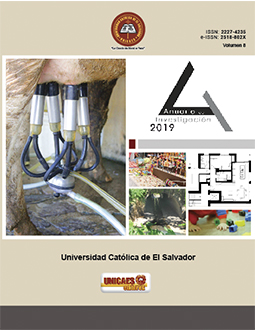Alternatives for solid waste management at the Catholic University of El Salvador
DOI:
https://doi.org/10.5377/aiunicaes.v8i0.8346Keywords:
Composting, waste management, recycling, environmental development and landfillAbstract
This article constitutes an important contribution to the social, human and environmental development of the Universidad Catolica de El Salvador, since it contributes to improve an environmental problem that requires urgent attention: the inadequate management of university solid wastes.
For this, a perception study was carried out, through the application of a survey aimed at students and workers of the institution.
Likewise, the solid wastes of the same were characterized, establishing the per capita generation, the daily total, the generating areas, the production and the composition of the same.
The per capita production of solid wastes in the University is 60 grams per day; while the total waste produced in a week was of 1750.56kg, with an average daily production of 291.76kg/day.
Through a sample, it could be determined that the 46.15% of the total waste produced in the institution is susceptible to the composting process (garden and food waste) due to the 47.1% is recyclable material and only the 6.75% is waste which is going to be destined to the landfill.
All these data served as a base to propose alternatives from the technical and environmental point of view.
Downloads
566
Downloads
Published
How to Cite
Issue
Section
License
© Anuario de Investigaciones

